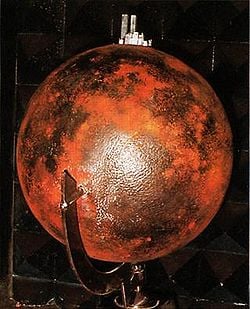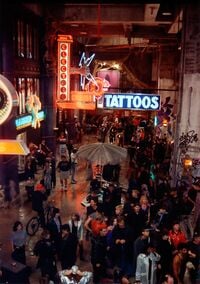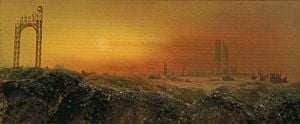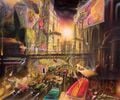Dinohattan
| Dinohattan | |
|---|---|

| |
| First appearance | Super Mario: Makai Teikoku no Megami (1993) |
| Latest appearance | The Making of... Super Mario Bros. (1993) |
| Greater location | Earth (parallel) |
| Ruler | The King (deposed) President Koopa (deposed) Princess Daisy |
| Inhabitants | Dinosaurs, Dinohattanites, Humans, Goombas, Bob-ombs, Banzai Bills, Snifits |
- “Ruler of all that you see. A few miserable streets and...endless desert.”
- —President Koopa, Super Mario Bros.
Dinohattan is the main dystopian setting of the Super Mario Bros. film, existing in a different parallel dimension to Earth. It is the film's equivalent of the Mushroom Kingdom and Dinosaur Land. Dinohattan is the name of both the city and the planet as a whole,[citation needed] as the city is surrounded by a vast, empty and dry desert. It is modeled after the Manhattan borough of New York City, bearing some resemblance to it including the buildings, subway stops, and overall look. A deleted scene explained that the similarities between the two were the result of President Koopa (when he was still a general) catching his eye on the skyscrapers of New York while hunting down Daisy's mother and the meteorite. The name Dinohattan is a portmanteau of the words "dinosaur" and "Manhattan". The name is never said within the film itself, though it appears on a sign at a subway stop, related media, and on the back of the film's packaging.
According to director Rocky Morton, Dinohattan was directly inspired by Dinosaur Land.[1]
History[edit]
According to the film's introduction, the meteorite impact that hit Earth about 65 million years ago was powerful enough to split Earth into two parallel dimensions, one being Earth and one being Dinohattan. While the dinosaurs became extinct on Earth due to the meteor impact, it gave rise to the Dinohattanites within Dinohattan. Dinosaurs living at the meteorite impact site were exposed to its geomagnetic energy, gradually evolving into the Portal Guardian cult. The Guardians were devoted to worshiping the monolith and maintaining the gateway between worlds, secretly ruling through the Monarchy. They harnessed its energy into the grid that powers their great city.
However, their deteriorating dimension forced the planet's population into the capital city, straining resources and fracturing confidence in the Monarchy. The Portal Guardian cult lost influence and faith, further dividing the already desperate people. General Koopa, head of the military command, proposed merging the dimensions to claim the long-coveted stability and resources of the alternate Earth dimension. The Portal Guardians refused, though Koopa was given oversight of the city's power grid for research into conservation efforts.
General Koopa used this position to secretly develop the de-evolution technology for a military coup that saw the slaughter of the entire Portal Guardian cult, and the land's King was turned into a mass of fungus. Only Daisy's mother escaped, fleeing into the Earth dimension with her unborn daughter and the meteorite pendant necessary for Koopa's planned merge. The general pursued her into the dimension, first witnessing New York City.
This fleeting vision obsessed Koopa with recreating the modern metropolis in his own dimension. However, he was unable to accomplish it and instead created a grotesque parody,[2] which deepened his desire to rule Earth instead. While Koopa maintained that his desire to conquer the parallel Earth was meant to return his people to their former dominance, it is implied that he only sought Earth for himself.
It is revealed early in the film that a link between the worlds exists within the sewers of New York City. Koopa's assistant, Lena, manages to merge the two dimensions briefly in the film's climax. The film concludes with President Koopa's defeat, as the rule is returned to the King, and his daughter, Princess Daisy.
Geography[edit]
Except for the city of Dinohattan, the entire planet is a harsh desert known as the Koopahari Desert. Very few resources can be found in this environment, which is compounded by heavy pollution.
Dinohattan itself has deteriorated even further due to crime and pollution resulting from President Koopa's neglect. A thick web of fungus (which is revealed to be the King) has also spread across the city, which has disrupted any attempts at repair or expansion.
Locations[edit]
- Dinohattan (Main city)
- Koopa's Tower
- Police Station
- The prison
- Devo Chamber
- Koopa Square
- Bullet Bill's
- Boom Boom Bar
- Thwomp Stomper Store
- The junkyards
- The Statue of Repression
- Koopahari Desert Tunnel (unfinished)
Government[edit]

Dinohattan was originally ruled by the King (unrelated to the character Koopa) and his unnamed wife, a member of the Portal Guardian society. However, Koopa, a military officer, staged a coup and de-evolved the King into the fungus that now spreads throughout the entire city. His chief platform as leader is to merge Dinohattan's world with Earth, and conquering it by claiming possession of a fragment of the meteorite that had destroyed the dinosaurs.
With the King and Queen gone, Koopa set up a false democracy with himself the "President". He maintained this position for twenty years through false elections and secret police made up of de-evolved Goombas that remove political dissenters from the public eye. Koopa is eventually overthrown by Mario and Luigi in the film's ending, returning the King to his Dinohattanite form and duties, alongside his daughter, Princess Daisy.
Currency[edit]
- Main article: Coin
The film repeatedly mentions "gold Koopa Coins" and "Koopons" throughout the film, suggesting some similarity to the form of currency seen in the games. The name features Koopa's name as well, which implies he renamed it upon taking over Dinohattan.
Inhabitants[edit]
The inhabitants of Dinohattan are human-like creatures that evolved from dinosaurs displaced millennia ago from Earth. While most of the population is indistinguishable from mammalian-evolved humans, some do possess reptilian traits such as tails, slitted pupils, scales, and oviparity.
Typical dinosaurs also appear in the city, yet are treated as pets or wild animals. Koopa himself calls Yoshi a "throwback", suggesting a sense of special superiority to their ancestors. Other animals, such as real-world lizards and snakes, are seen or mentioned as food sources to the inhabitants. Several typical dinosaurs are also seen eating fungus, suggesting omnivorous or herbivorous behavior.
Notable inhabitants[edit]
- The King
- The Queen (deceased)
- Princess Daisy
- President Koopa (de-evolved)
- Iggy
- Spike
- Toad
- Lena (deceased)
- Big Bertha
- Yoshi
Gallery[edit]
Names in other languages[edit]
- Dinohattan
| Language | Name | Meaning | Notes |
|---|---|---|---|
| Japanese | クッパ Kuppa Ōkoku |
Koopa Kingdom | Super Mario: Makai Teikoku no Megami |
- Koopon
| Language | Name | Meaning | Notes |
|---|---|---|---|
| Japanese | クッパ[4] Kuppa |
Koopa | Super Mario: Makai Teikoku no Megami |
Notes[edit]
- President Koopa derisively calls Dinohattan "Mushroom Kingdom", referencing the setting of the original video game.
- Early names for the city include "Dyno-Yuck" and "Koopaville".
- The entirety of Dinohattan and its surrounding locations were built and filmed in a vacant five-story cement factory, located in Wilmington, North Carolina, the layout of which helped shape how Dinohattan was structured.[5] This factory was also used as the Shredder and the Foot Clan's hideout in Teenage Mutant Ninja Turtles (1990) and Top Dollar's nightclub in The Crow (1994).
- As dinosaurs in this world never became extinct, and were instead allowed to evolved into humans instead of the succeeding mammals, all vehicles in their world, including even the police cars, are powered by electricity generated by the meteorite's energy, with exposed generator-like engines protruding from their hoods and pantograph-like booms extending from their roofs similar to those of trams and some modern trains collecting power from overhanging wires, as gasoline, a type of fossil fuel, would not exist in their world due to all fossil fuels being considered by them as being sacred.
References[edit]
- ^ "We knew the game and we knew one of its areas was Dino World, so we thought that it would be a great place to go into." Statement by director Rocky Morton in Australian "Dinosaur Magazine," Starlog Telecommunications, Inc.[page number needed]
- ^ Comments by Super Mario Bros.' art director Walter Martishius in "New York, N.Y., It's Another Town", New York Times, August 16, 1992.
- ^ 1993. スーパーマリオ
魔界帝国 の女神 . Shogakukan (Japanese). Page 30. - ^ 1993. スーパーマリオ
魔界帝国 の女神 . Shogakukan (Japanese). Page 43. - ^ "When [David Snyder] saw the cement factory in Wilmington, North Carolina, [he] told Jake [Eberts] and Roland [Joffé] that [they'd] come home. "Home" in this instance was the five-story factory that had been used in the past to make Ideal Cement but was now vacant. The shape of the factory and all of its accompanying ramps, conveyor belts, and catwalks influenced they way David designed the sets.[...]In other words, the shape of the cement factory determined the shape that Koopa Square, a busy location in downtown Dinohattan, would take". - From Microchips to Movie Stars: The Making of Super Mario Bros., pages 34 and 35
| Super Mario Bros. film | |
|---|---|
| Protagonists | Mario • Luigi • Toad • Princess Daisy • The King • Daniella • Yoshi |
| Antagonists | President Koopa • Lena • Iggy • Spike • Sergeant Simon • Big Bertha • Anthony Scapelli |
| Minor characters | Angelica • Daisy's mother • Egon • Hat Check Girl • James • Old lady • Pizza Delivery Boy |
| Species | Dinohattanite • Fungus Unit • Goombas • Snifits |
| Locations | Dinohattan • Devo 4 • Devo Chamber • Koopa Square • Boom Boom Bar • Koopa's Tower • Koopahari Desert |
| Companies | Mario Brothers Plumbing • Scapelli Construction |
| Objects, items, etc. | Bob-ombs • De-evolution • Devolution Gun • Fireball gun • Meteorite piece • Sludge Gulper • Thwomp Stompers |
| Music | Original Motion Picture Soundtrack • Almost Unreal • Walk the Dinosaur |
| Manga | Super Mario: Makai Teikoku no Megami • Bakudan Kinoko |
| Miscellaneous | Deleted scenes • ERTL Merchandise • Gallery • The Making of... Super Mario Bros. • Staff • Trading Cards |





